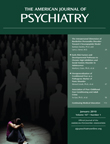Classification systems inevitably reflect the state of science at the time they are formalized (
1). In psychiatry, DSM-III revolutionized the field of mental health diagnosis in 1980 by eschewing theoretical explanations in favor of diagnostic reliability. Among the major consequences of this initiative was the flourishing of evidence-based research, leading to an exponential growth of psychiatric literature. Since then, some diagnostic criteria have been put to the test and retained, removed, or reconceptualized. A maximum age at onset as a diagnostic criterion for attention deficit hyperactivity disorder (ADHD) was introduced in DSM-III on the basis of clinical experience. In DSM-IV-TR, this B criterion specifies that "some hyperactive-impulsive or inattentive symptoms that caused impairment were present before age 7 years." Over the intervening years, a number of studies have addressed the utility of criterion B, generally questioning its contribution to the validity of the diagnosis of ADHD (
2).
We performed a systematic review of the literature focusing on studies on the age at onset of ADHD. A search conducted in both MEDLINE and PsycINFO databases retrieved 2,097 abstracts; 31 studies reporting original data on the onset of ADHD were selected. The findings are summarized here; complete results are presented in the supplementary online material.
An analysis of the DSM-IV field trials revealed differences in ages at onset according to ADHD subtype, with the inattentive group exhibiting a later onset (
3). The authors of this report also questioned the criterion's diagnostic utility, as its adoption increased false negatives in comparison with clinical validation diagnosis (clinicians validated 75% of cases meeting symptom criteria but lacking the onset criterion). Data from an adult population survey showed that only 50% of individuals with clinical features of ADHD retrospectively recalled an onset before age 7; by contrast, 95% recalled an onset before age 12 and 99% before age 16 (
4). A series of studies examining later-onset ADHD cases found that individuals who did not meet the onset criterion resembled those with the full diagnosis in terms of neuropsychological profile, comorbidity, substance use, personality traits, and impairment (
5–
8). Response to treatment with stimulants has also been shown to be similar among children, adolescents, and adults whether or not they met criterion B (
9,
10). Cohort studies, which are unbiased by memory recall, have confirmed the similarities between early- and late-onset ADHD groups in terms of psychopathology and impairment (
11–
13). For example, in a representative sample of the British population prospectively assessed for ADHD, those with symptoms before age 7 years and those with a new onset of symptoms between ages 7 and 12 years did not differ significantly on clinical, cognitive, and impairment measures or in environmental stressors or perinatal risk factors (G. Polanczyk et al., personal communication, 2009). Prospective data also demonstrate the poor stability of the recall of age at onset, with nearly one-half of the children assessed and diagnosed with ADHD not meeting the onset criterion in later life when reassessed retrospectively (
12). In contrast, no studies provided significant findings differentiating children with onset before and after age 7 years.
Differences in study design hamper a formal meta-analysis of reports focusing on the age at onset of ADHD. In addition, some studies assessed the onset of ADHD symptoms, rather than the onset of impairment, as required by DSM-IV—the latter is more likely to depend on environmental demands, such as school. In keeping with the conceptual decision to differentiate assessments of symptoms and impairment (
1), the age at onset of symptoms should be prioritized for diagnostic purposes.
In sum, despite a lack of empirical support, the age 7 onset criterion was retained across three DSM editions. Although historically defined as a disorder of childhood, ADHD is increasingly recognized as a valid diagnosis in the adult population, for whom the age at onset criterion is even more problematic because of increased problems with retrospective recall (
14). As prospective and retrospective data indicate that only one-half of adults who are assessed for ADHD symptoms report their presence by age 7, an extension of the age at onset criterion is both prudent and necessary. In our review of the literature we found studies with various designs converging on the transition from childhood to adolescence as an optimal cutoff point. Application of such an evidence-based approach to DSM-V provides support for a preliminary recommendation to reformulate the onset criterion by requiring the presence of symptoms by age 12. Such a revision would minimize false negatives, which are particularly likely when cases are assessed later in life, while reaffirming ADHD as a disorder of childhood onset.

